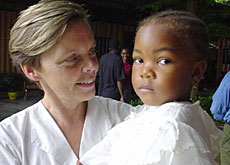Swiss woman wins hearts for Aids work

The extraordinary life of a Swiss woman who cares for Aids patients in Ivory Coast has become the subject of a book.
swissinfo spoke to Lotti Latrous on one of her rare visits to Switzerland to find out more about her work at a hospice in Abidjan.
Her life is chronicled in “Lotti La Blanche” (Lotti the white woman), her nickname in the slums of Abidjan where she works.
The wife of a Nestlé manager, Latrous moved to Ivory Coast in 1994. Shocked by the extent of the Aids epidemic in Ivory Coast – official estimates say 12 per cent of the population are HIV-positive – Latrous founded an Aids hospice with the help of a local doctor in the slums of Abidjan in 1999.
Last year Latrous received the Adèle Duttweiler prize, given annually to Swiss people or organisations involved in charitable work either in Switzerland or abroad.
swissinfo: What does your work among Aids patients in Ivory Coast involve?
Lotti Latrous: My aim is to give Aids victims love before they die and to give them the possibility to die with dignity. My aim is also to convince them that before they die they have become very, very important to somebody, because they are completely neglected and rejected by their families because of Aids.
swissinfo: Your work must be very challenging, very difficult. How do you find the strength to go to work everyday?
L.L.: First, I don’t think you can call it work. It’s not a job; it’s something I have chosen to do. And I don’t go into work – I live there.
The strength I have, I receive from what I am doing, because it is the meaning of my life.
swissinfo: Do you not only have to fight against the illness but also against the attitudes of people towards Aids?
L.L.: Yes, because in Africa, Aids is still something considered very bad – to do with black magic. We have to fight against that and we also have problems with the Churches because they believe that praying can cure Aids.
So we try to explain to the population that it is a sickness, and we can live with the sickness and we have to accept it. We have been there for six years now and the population trusts us. They know we are telling the truth, that we are not just there from the morning to the evening and then going home to our villas.
swissinfo: Have you ever been confronted with fighting during the civil unrest in Ivory Coast?
L.L.: No, not in the slums, because nobody’s coming to the slums. There is nothing to steal, so my place is very safe.
swissinfo: You mentioned that you actually live at the hospice, but your family lives in Egypt. How do you reconcile the two?
L.L.: My husband and my youngest daughter live in Egypt and my two oldest children live in Lausanne. I try to go to Egypt every three months, so I see my family at least five or six times a year.
It was very difficult for them a few years ago because I had to take the decision whether to stay in Ivory Coast when my husband had to go to Egypt. I tried one month in Egypt and one month in Ivory Coast, but it didn’t work.
So I had to make the choice between my family and the hospice. I love my children, I love my husband but they are not the meaning of my life: the hospice is.
swissinfo: Do you have any future projects in Ivory Coast? How will you develop your work there?
L.L.: That’s a very good question because I find that a lot of people say to me, “we can construct you a hospital, we can build you another hospital”, but this is not the aim of my work. I am not here to manage five, six, seven hospitals.
My aim is to be in the hospice and to be with the dying people and help them.
swissinfo: So is the fame that the hospice, the prize and now the book have brought you perhaps something you don’t really want?
L.L.: I did not at all suspect that this would happen. I could not even imagine how popular I would become. I think maybe if I had known, I would have not accepted because this is not the most important thing for me. The meaning of my life is in the slums, and that’s it.
swissinfo-interview: Isobel Leybold
Lotti Latrous was born in 1953 in Dielsdorf, Switzerland.
At the age of 16 she went to Geneva as an au pair to learn French and met her husband, Aziz Latrous.
Latrous has spent most of her married life in Africa.
For six years, she has been helping Aids patients in the slums of Abidjan.
In 2002 she won the Adèle Duttweiler prize for her work.

In compliance with the JTI standards
More: SWI swissinfo.ch certified by the Journalism Trust Initiative









You can find an overview of ongoing debates with our journalists here . Please join us!
If you want to start a conversation about a topic raised in this article or want to report factual errors, email us at english@swissinfo.ch.